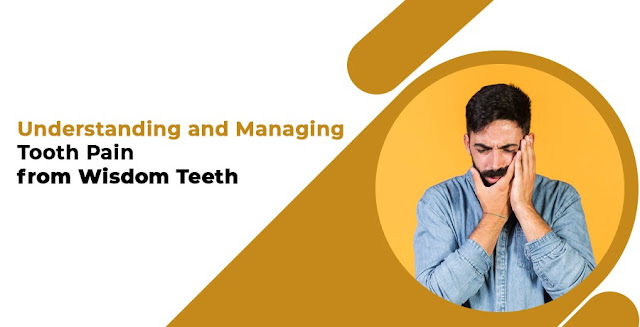Wisdom Teeth Woes: Understanding and Dealing with the Pain
Why do wisdom teeth hurt?
Stuck teeth: Sometimes, wisdom teeth don't have enough room to grow correctly, so they push against other teeth or your gums, causing pain and swelling.
Infected gums: This can happen when wisdom teeth don't fully erupt through the gums, creating a breeding ground for bacteria. It can cause pain, swelling, redness, and difficulty opening your mouth.
Cavities: Since wisdom teeth are hard to reach, they're more likely to get cavities, which can cause pain, sensitivity, and even infection.
Gum disease: This can affect the gums surrounding wisdom teeth, leading to pain, inflammation, and bleeding.
Signs of wisdom tooth pain:
- Pain in your jaw, gums, or teeth
- Swollen jaw or gums
- Difficulty opening your mouth
- Bad breath
- Unpleasant taste in your mouth
- Red or bleeding gums
Easing the pain:
- Pain relievers: Over-the-counter medications like ibuprofen or acetaminophen can help manage pain and inflammation.
- Saltwater rinses: Rinsing with warm salt water several times a day can soothe the gums and reduce swelling.
- Ice packs: Applying an ice pack to the outside of your jaw can help reduce pain and inflammation.
- Soft foods: Eating soft foods that are easy to chew can help avoid irritating the gums.
- Good oral hygiene: Brushing and flossing regularly can help prevent tooth decay and gum disease in wisdom teeth.
When to see a dentist:
If your wisdom tooth pain is severe or doesn't improve with home care, see a dentist. They will figure out what's causing the pain and recommend the best way to fix it. Depending on the issue, they might suggest:
Wisdom Tooth Extraction: This is the most common treatment for problematic wisdom teeth.
Antibiotics: If you have an infection, your dentist might prescribe antibiotics to clear it up.
Other treatments: In some cases, other treatments like gum surgery or tooth removal might be necessary.
Preventing wisdom tooth problems:
There are a few things you can do to help prevent wisdom tooth problems:
Regular dental checkups: Regular checkups allow your dentist to keep an eye on your wisdom teeth and spot any potential problems early on.
Good oral hygiene: Brushing and flossing regularly can help keep your mouth healthy and prevent tooth decay and gum disease.
Healthy diet: Eating a healthy diet can help strengthen your teeth and gums.
Avoiding smoking: Smoking can increase your risk of developing wisdom tooth problems.
World of Dentistry in Gurgaon:
If you're in Gurgaon and experiencing wisdom tooth pain, World of Dentistry, Dental Clinic in Gurgaon can help. Our experienced and compassionate dentists provide high-quality dental care at affordable prices. We offer a wide range of services, including wisdom tooth extraction, using the latest technology and techniques to ensure you receive the best possible care.

.jpg)
.jpg)

Comments
Post a Comment